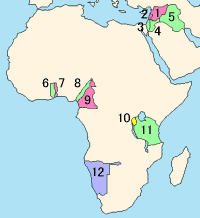RE:
Who Are The Palestinians? Part 2
⁜→ Sixties Fan, et al,
BLUF: I am not sure what difference the "magnitude"
(the extent observers the number) has to do with the impact on and decision. Whether it is Zero, a hundred thousand, or in the millions. The numbers should not alter or influence the decisions to be made.
Dear Friends, For decades, Israel has been blamed for the failure of peacemaking attempts while Palestinian intransigence has been widely ignored

honestreporting.com
(REFERENCEs)
There are requirement issues and criteria that need to be agreed upon.
For nearly three-quarters of a century, the Arab Palestinians in the territories adjacent to Israel have considered themselves some sort of special case. And they have determined that they can alter the definition of a "Refugee" that is much, much broader than humanity has considered and defined a "Refugees" in the past
(and unto the present day).
In my opinion, there are a couple of key points that will significantly reduce the numbers covered for services under CERI (Consolidate Eligibility Registration Instructions). A Palestinian Refugee is defined by CERI as:
Consolidate Eligibility Registration Instructions said:
Palestine Refugee Any person whose normal place of residence was Palestine during the period 1 June 1946 to 15 May 1948 and who lost both home and means of livelihood as a result of the 1948 conflict, and descendants of such persons, including legally adopted children, through the male line. UNRWA’s Palestine Refugee criteria are formulated for the Agency’s operational purposes. There are persons who are registered by host countries/authorities as Palestine refugees or Palestinian refugees but who are not registered as Palestine Refugees in the United Nations Relief and Works Agency for Palestine Refugees in the Near East (UNRWA) Registration System and who may or may not meet UNRWA’s Palestine Refugee criteria.
NOTE: "The purpose of this definition to set out for the guidance of UNRWA staff, the persons and categories of persons who are eligible to register to receive UNRWA services and those who are eligible to receive services without being registered;
"The 1951 Convention consolidates previous international instruments relating to refugees and provides the most comprehensive codification of the rights of refugees at the international level. In contrast to earlier international refugee instruments, which applied to specific groups of refugees, the 1951 Convention endorses a single definition of the term “refugee” in Article1.
United Nations Convention relating to the Status of Refugees said:
EXCERPT • Article 1
For the purposes of the present Convention, the term “refugee” shall apply to any person who:
(1) Has been considered a refugee under the Arrangements of 12 May 1926 and 30 June 1928 or under the Conventions of 28 October 1933 and 10 February 1938, the Protocol of 14 September 1939 or the Constitution of the International Refugee Organization; Decisions of non-eligibility taken by the International Refugee Organization during the period of its activities shall not prevent the status of refugee being accorded to persons who fulfill the conditions of paragraph 2 of this section;
(2) As a result of events occurring before 1 January 1951 and owing to well-founded fear of being persecuted for reasons of race, religion, nationality, membership of a particular social group or political opinion, is outside the country of his nationality and is unable or, owing to such fear, is unwilling to avail himself of the protection of that country; or who, not having a nationality and being outside the country of his former habitual residence as a result of such events, is unable or, owing to such fear, is unwilling to return to it. In the case of a person who has more than one nationality, the term “the country of his nationality” shall mean each of the countries of which he is a national, and a person shall not be deemed to be lacking the protection of the country of his nationality if, without any valid reason based on well-founded fear, he has not availed himself of the protection of one of the countries of which he is a national.
NOTE: "The emphasis of this definition is on the protection of persons from political or other forms of persecution. A refugee, according to the Convention, is someone who is unable or unwilling to return to their country of origin owing to a well-founded fear of being persecuted for reasons of race, religion, nationality, membership of a particular social group, or political opinion."
(COMMENT)
While the descendants of Refugee, including legally adopted children, are eligible for services under CERI, they should not be considered a Refugee if they have never lived anywhere other than a territory adjacent to Israel.
While the Arab Palestinians considered themselves Refugees, they are NOT Refugees if they enjoy the protection of the State of Palestine
(alla 2012) or have participated in the Arab Palestinian elections of 2006.
While the Arab Palestinians considered themselves Refugees, they are NOT Refugees if they represent a threat to national security, public order, public health, or a danger to the other rights recognized in the
International Covenant on Civil and Political Rights (CCPR).
While the Arab Palestinians considered themselves Refugees, they are NOT Refugees if they have been involved in Any propaganda effort for war, or the advocacy of national, racial, or religious hatred that constitutes incitement to discrimination, hostility, or violence prohibited by law (IAW CCPR).
Most Respectfully,
R

honestreporting.com





